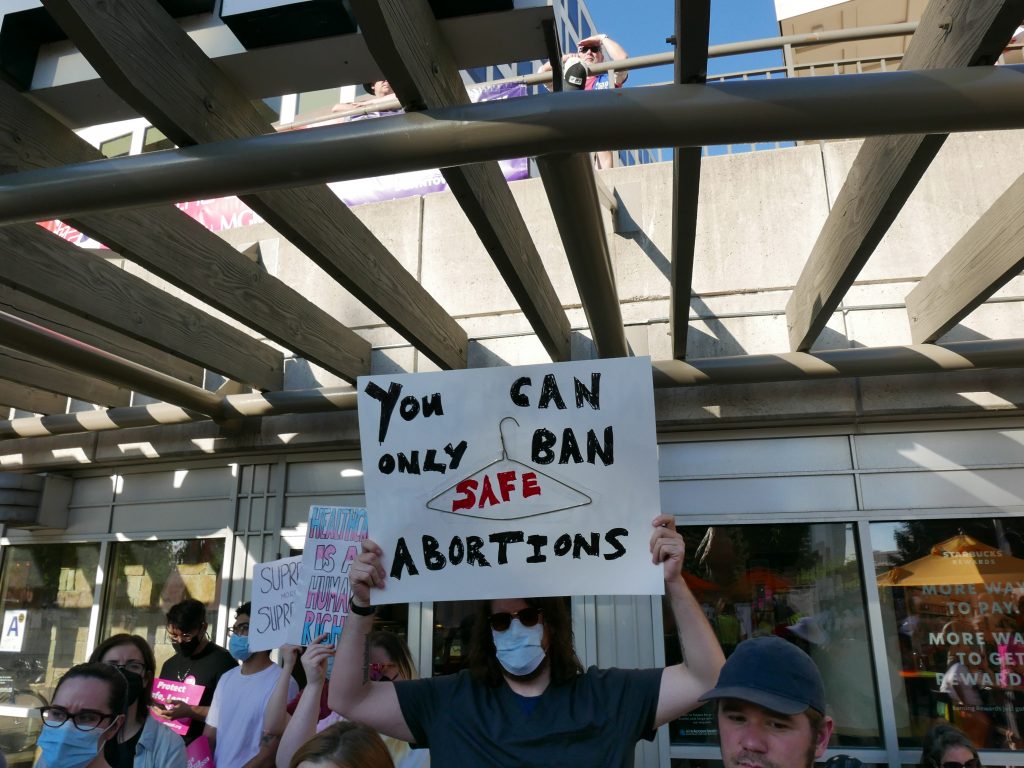Questions Linger Over Post-Roe Landscape in Wisconsin
Is the state's abortion ban from 1849 enforceable? Is abortion the first right, thought protected, to be repealed?
When the the U.S. Supreme Court released its decision Friday overturning federal protection for abortion, questions arose around what a post-Roe Wisconsin will look like.
Wisconsin is one of 21 states with trigger laws or pre-Roe laws in place that will likely ban or restrict abortion following the decision. In Wisconsin, it’s an 1849 law that makes providing an abortion a felony. The 173-year-old law makes no exception for rape, incest, physical health or lethal fetal anomaly. The procedure is only permissible if deemed medically necessary to save a pregnant person’s life.
Planned Parenthood of Wisconsin (PPWI) representatives denounced the Supreme Court’s decision to strike down Roe v. Wade in a press conference Friday afternoon, calling the decision “dangerous and chilling.”
President and CEO Tanya Atkinson, Medical Director Dr. Kathy King and Director of Legal Advocacy Services Michelle Velasquez were present.
“Today, a physician treating a pregnant patient with medical complications will now face felony criminal charges and imprisonment if a prosecutor disagrees that the medically indicated abortion they performed was indeed life saving enough,” King said. “There is a real risk that medical care will be compromised.”
Of Planned Parenthood’s three Milwaukee locations, one offers abortion services. Following the leak of a draft decision in May, the clinic suspended the scheduling of abortion appointments beyond June 25. But when the news broke this morning, the waiting room was full of patients.
Approximately 70 patients were scheduled for abortion procedures June 23 and June 24. If they wish to access the procedure, they will now have to travel to another state.
More than 80 prosecutors across the country, including Milwaukee County District Attorney John Chisholm, signed a commitment to not prosecute those who “seek, provide, or support abortions.”
Because of that, it’s possible, said Sara Benesh, that abortion procedures may eventually resume despite the 1849 law.
“Wisconsin, and a couple other states, are in this weird position of having these really ancient laws that were, in effect, deemed unconstitutional by Roe v. Wade, but have remained on the books because we generally don’t clean up our statutes,” said Benesh, chair of the political science department at the University of Wisconsin-Milwaukee.
Barbara Zabawa, co-chair of the master of healthcare administration program at the University of Wisconsin-Milwaukee, pointed to the dissenting opinion released by Justices Stephen Breyer, Sonia Sotomayor and Elena Kagan, noting that it echoes warnings from activists that the decision could mark the beginning of a long-term attack on rights currently considered protected by the constitution, including the use of contraception and same-sex marriage.
The dissent was concerned that we’ve entered a slippery slope of rights being revoked, she said. “Those kinds of state laws could, if challenged, use this Supreme Court decision today as justification for keeping those laws relevant and legal. So, those other rights that we’ve come to, you know, rely on—anything really related to our right to privacy,” she said. “Really, I mean, it could be threatened.”
If you think stories like this are important, become a member of Urban Milwaukee and help support real, independent journalism. Plus you get some cool added benefits.
More about the Overturning of Roe v. Wade
- Three Years After the Dobbs Decision, Wisconsin Republicans are Still Trying to Ban Reproductive Freedom - Democratic Party of Wisconsin - Jun 24th, 2025
- On 3rd Anniversary of Roe Being Overturned, Baldwin, Blumenthal, and Murray Lead Senate Dems in a Bill to Restore Abortion Access Nationwide - U.S. Sen. Tammy Baldwin - Jun 24th, 2025
- Support for Abortion Rights Remains Strong in Wisconsin on Third Anniversary of MAGA U.S. Supreme Court Justices Overturning Roe v. Wade - A Better Wisconsin Together - Jun 24th, 2025
- MAGA Wisconsin GOP Pushed to Restrict IVF Access, Reproductive Freedom - Democratic Party of Wisconsin - Feb 27th, 2024
- Families Are Losing Access to IVF Because of Donald Trump - Democratic Party of Wisconsin - Feb 23rd, 2024
- Planned Parenthood Seeks Wisconsin Supreme Court Ruling On Abortion - Hope Kirwan - Feb 22nd, 2024
- PPWI Asks Wisconsin Supreme Court to Protect Abortion Rights - Planned Parenthood of Wisconsin - Feb 22nd, 2024
- Wisconsin Democrats on Donald Trump’s National Abortion Ban - Democratic Party of Wisconsin - Feb 16th, 2024
- How Did Dobbs Decision Affect State’s Birth Rate? - Bridgit Bowden - Jan 2nd, 2024
- Gov. Evers Slams Republicans’ New Effort to Restrict Reproductive Healthcare in Wisconsin - Gov. Tony Evers - Dec 21st, 2023
Read more about Overturning of Roe v. Wade here





















